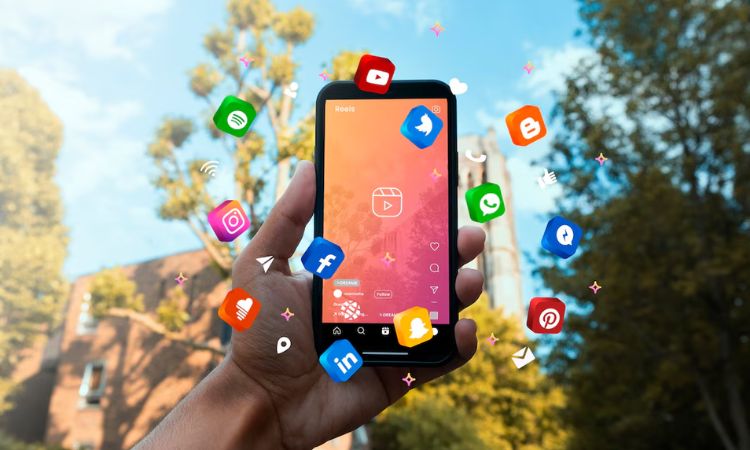What is Social Media Marketing and How Does It Help Businesses
|
Getting your Trinity Audio player ready...
|
Table of Contents
ToggleWhat Is Social Media Marketing (SMM)?
In today’s digital era, social media has transformed from a platform for social interactions into a powerful marketing tool.
Social Media Marketing (SMM) has become an essential part of business strategies, enabling brands to engage with their audience, build brand awareness, drive traffic, and boost sales.
Whether you’re a startup, a small business, or a large corporation, leveraging social media marketing can be a game-changer for your growth.
SMM involves various strategies such as content marketing, influencer collaborations, paid advertising, community engagement, and analytics tracking.
The goal is to create meaningful connections with customers while promoting brand messages effectively. With billions of users active on social media daily, businesses cannot afford to overlook the immense potential these platforms offer.
How Does Social Media Marketing (SMM) Help Businesses?

Social media marketing (SMM) is a powerful strategy that businesses of all sizes use to grow their brand and connect with their audience. With billions of active users on platforms like Facebook, Instagram, LinkedIn, and Twitter, businesses have a massive opportunity to connect with their target audience, build brand awareness, and drive sales. Here’s how SMM helps businesses grow:
1. Increases Brand Awareness
Social media platforms allow businesses to reach a wider audience quickly. By consistently posting engaging content, brands can enhance visibility and recognition, making it easier for potential customers to discover and remember them.
2. Boosts Website Traffic
By sharing blog posts, product updates, and promotional content with relevant links, businesses can drive traffic to their websites. Well-optimized social media profiles and compelling call-to-action (CTA) buttons also encourage users to visit company websites and explore their offerings.
3. Enhances Customer Engagement
Social media enables interactive communication between businesses and customers, creating meaningful engagement and connections. Engaging with followers through comments, messages, and interactive content like polls and Q&A sessions helps build strong relationships and customer loyalty.
4. Generates Leads and Sales
Platforms like Facebook, Instagram, and LinkedIn offer targeted advertising options that allow businesses to reach potential customers based on demographics, interests, and behaviors. Well-planned social media campaigns can generate high-quality leads and boost conversions.
5. Builds Brand Authority and Trust
Sharing valuable content, responding to customer queries, and showcasing customer testimonials help businesses establish credibility and authority in their industry. Consistent engagement and transparency foster trust, making people more likely to choose your brand over competitors.
6. Cost-Effective Marketing Strategy
Compared to traditional advertising, social media marketing is a budget-friendly option. Even small businesses can leverage organic reach and affordable paid promotions to get maximum exposure without breaking the bank.
7. Provides Valuable Customer Insights
Social media platforms offer analytics tools that help businesses track performance, understand customer preferences, and refine their marketing strategies. Insights like engagement rates, click-through rates, and audience demographics allow brands to make data-driven decisions.
8. Supports Customer Service and Reputation Management
Many customers turn to social media for inquiries, feedback, or complaints. Prompt responses and effective issue resolution improve customer satisfaction and enhance a brand’s reputation.
How Social Media Marketing (SMM) Works

Social Media Marketing (SMM) involves leveraging social media platforms to promote brands, products, or services, engage with audiences, and drive business growth.
It involves creating and sharing content, engaging with users, running advertisements, and analyzing performance to achieve marketing goals. The key components of SMM include:
1. Content Creation & Distribution
High-quality content is the foundation of any successful SMM strategy. This includes blog posts, infographics, videos, live streams, and memes that align with the brand’s identity and audience interests.
2. Community Engagement
Engaging with followers by responding to comments, hosting Q&A sessions, and participating in discussions builds trust and strengthens customer relationships.
3. Social Media Advertising
Paid advertisements on social media allow businesses to target specific demographics based on age, interests, location, and online behavior, ensuring maximum return on investment.
4. Influencer Marketing
Collaborating with social media influencers who have a loyal audience can significantly boost brand visibility and credibility.
5. Analytics & Performance Tracking
Measuring key metrics such as engagement rates, reach, conversions, and click-through rates helps businesses refine their strategies and maximize effectiveness.
Common Social Media Platforms Used for Marketing Include:

- Facebook – Ideal for brand building, customer engagement, and targeted advertising.
- Instagram – Focuses on visual content, influencer marketing, and e-commerce integrations.
- Twitter (X) – Suitable for real-time updates, customer interactions, and trend-based marketing.
- LinkedIn – Ideal for B2B marketing, industry networking, and establishing thought leadership.
- TikTok – Great for viral content, short-form videos, and engaging younger audiences.
- Pinterest – Useful for visual discovery, DIY projects, and e-commerce promotions.
Why Is Social Media Marketing (SMM) So Powerful?

1. Increases Brand Awareness
Social media platforms provide a global reach, allowing businesses to showcase their brand to a vast audience. Consistently posting quality content helps in brand recognition and recall.
2. Drives Website Traffic
By sharing blog posts, product pages, and promotions, businesses can drive traffic to their website. Platforms like Pinterest and Twitter (X) are especially effective for redirecting users to websites.
3. Generates Leads and Sales
Social media provides a direct channel to attract potential customers. Features like Instagram Shopping, Facebook Marketplace, and LinkedIn Lead Forms help businesses generate leads and convert them into sales.
4. Enhances Customer Engagement
Interacting with customers on social media builds strong relationships. Prompt responses to queries and engaging content make customers feel valued, increasing brand loyalty.
5. Provides Competitive Advantage
Monitoring competitors’ social media strategies helps businesses identify industry trends and stay ahead of the competition. Understanding customer preferences allows for better decision-making.
6. Boosts SEO Efforts
While social media doesn’t directly impact SEO rankings, increased engagement and website traffic from social platforms signal search engines that a brand is authoritative and relevant.
What Is Sticky Content in Social Media Marketing?
Sticky content refers to engaging and compelling content that keeps users interested, encourages them to spend more time on a page, and fosters repeated interactions.
The primary goal of sticky content is to increase user retention and encourage sharing.
Characteristics of Sticky Content:
- Emotionally engaging (humor, inspiration, or storytelling)
- Highly informative or entertaining
- Visually appealing (videos, infographics, memes)
- Interactive (polls, quizzes, and challenges)
- Encourages discussion and user-generated content
What Is Viral Marketing in Social Media Marketing?
Viral marketing is a digital strategy that aims to create content that spreads rapidly through shares, likes, and reposts.
Viral content is usually entertaining, shocking, or emotionally compelling, making users more likely to share it with their networks.
Key Elements of Viral Marketing:
- Strong emotional appeal (funny, inspiring, relatable)
- Easy to share across different platforms
- Short, engaging, and visually appealing content
- Taps into trending topics or current events
Examples of viral marketing include meme campaigns, challenge-based trends (like the Ice Bucket Challenge), and influencer collaborations that spark massive engagement.
What Is Earned Media in Social Media Marketing?
Earned media refers to organic exposure and recognition a brand receives without directly paying for it.
It results from customer interactions, word-of-mouth marketing, and media coverage, contributing to the brand’s credibility and trustworthiness.
Examples of Earned Media:
- Shares and retweets of brand content
- Customer reviews and testimonials
- Influencer mentions and recommendations
- Media coverage from third-party publications
- User-generated content (UGC) featuring the brand
Fifth Shield
Fifth Shield is a top-rated social media marketing agency in Delhi, helping businesses amplify their digital presence and drive engagement.
With a team of experts, we craft result-driven strategies tailored to your brand’s goals. From content creation and influencer marketing to paid advertising and performance tracking, we ensure maximum ROI.
Whether you’re a startup or an established brand, our innovative approach boosts brand visibility, generates leads, and enhances customer interaction.
Partner with Fifth Shield to transform your social media presence and stay ahead in the competitive digital landscape.
Wrapping Up
Social media marketing is no longer optional; it is a necessity for businesses looking to establish a strong digital presence.
From brand awareness and customer engagement to lead generation and sales, social media plays a pivotal role in business growth.
By leveraging the right strategies, creating compelling content, and engaging with the audience, businesses can harness the full potential of social media marketing to stay competitive in the ever-evolving digital landscape.
Is your business ready to grow and thrive with social media marketing? Start today and watch your brand grow!
Don’t Miss: What is Digital Marketing and How Does It Work?







Write a Comment